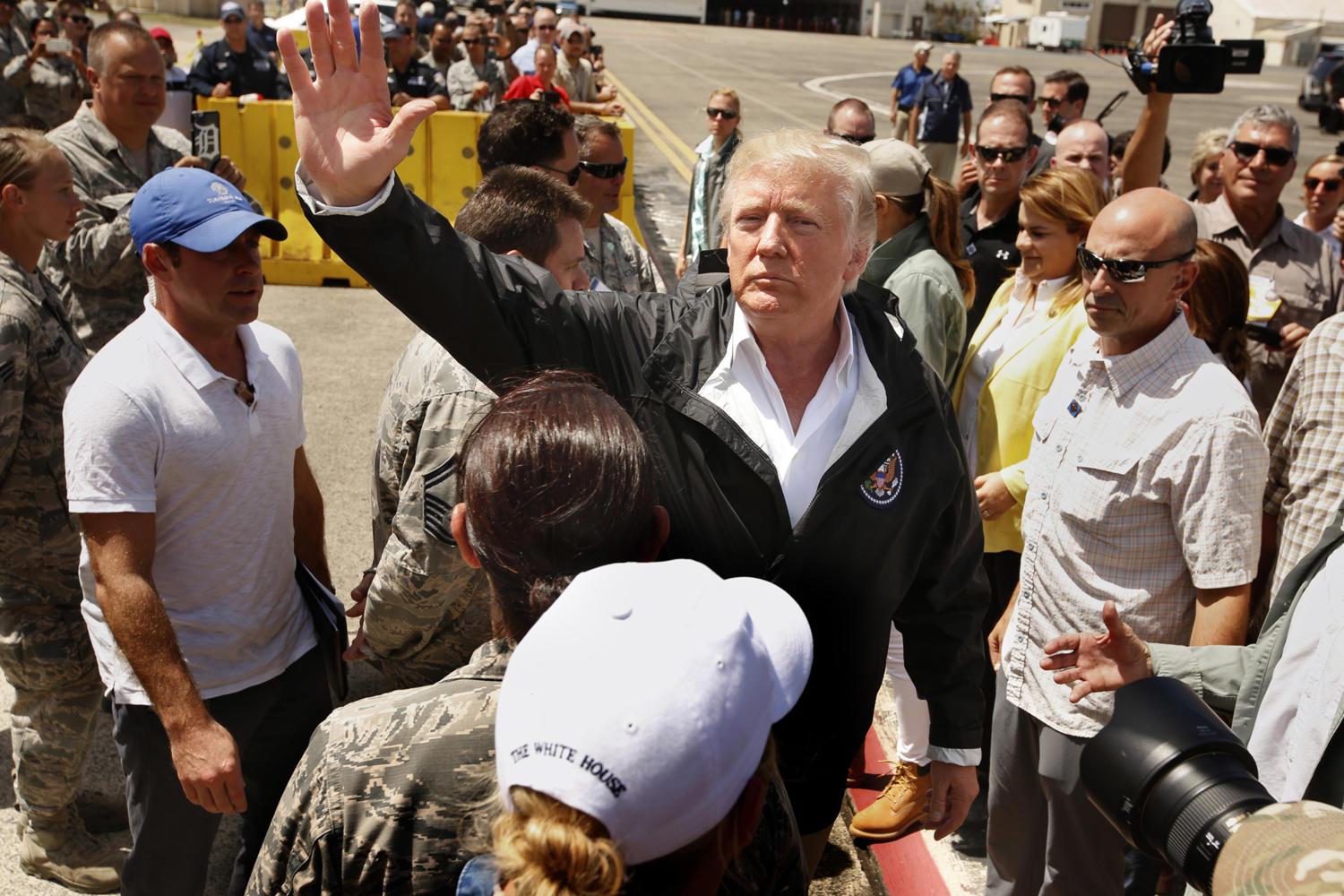In wake of Maria don’t blame Puerto Rico, blame the U.S.


President Donald Trump and first lady Melania Trump arrive at Muniz Air National Guard Base in Carolina, Puerto Rico, on Oct. 3. (Carolyn Cole/Los Angeles Times/TNS)
In the wake of Hurricane Maria, an overwhelming 80 percent of the 3.4 million Americans in Puerto Rico are still without electricity, adequate amounts of food and hospital supplies and, most alarmingly, potable water. Shipments of water can’t keep up with the demand, and the islanders are turning to wells on sites contaminated with hazardous waste instead of chancing the tap water they fear may be infected with diseases.
In a rapid string of Oct. 12 tweets, President Donald Trump blamed Puerto Rico yet again for its own disaster.
The people of Puerto Rico are dying — the death toll as of Oct. 17 was 48 — but the U.S. government is treating the situation in an unacceptably flippant manner. Christian Snyder wrote a column for The Pitt News over the summer detailing how the U.S. tax laws are responsible for much of Puerto Rico’s financial crisis. But in light of Hurricane Maria, it’s clear that it’s not just tax laws that are to blame — U.S. attitude and a multitude of U.S. laws, including the lately debated Jones Act, are at fault.
Trump’s claim that Puerto Rico’s financial crisis is solely the fault of the Puerto Rican people is ludicrous and ignorant. The same day as Trump’s tweets, Rep. Nydia Velazquez, D-N.Y., made an impassioned speech before the Financial Services Committee in an effort to hold both the president and his choice for Secretary of Housing and Urban Development, Ben Carson, accountable for the ridiculous falseness of the tweets.
“I am the only member [of this committee] who is a Puerto Rican-American citizen,” Velazquez said, directly addressing Carson. “I just would like for you to let him know how shameful all the tweets that he put out this morning are … and I would like to suggest that the president get some history lessons regarding the Puerto Rican relationship with the United States.”
And if the president does as Velazquez suggests, he’ll find on multiple occasions in our complicated history with the island that the United States imposed economic laws that greatly hindered, and perhaps doomed, Puerto Rico’s chances at development.
Congress passed the Merchant Marine Act, or the Jones Act, in 1920 to protect American shipping and ensure national security. The Jones Act said only American-built, -manned and -owned ships may transport goods and people between U.S. ports.
This antiquated law mandated that foreign ships pay extra tariffs and taxes to unload into Puerto Rican ports, which are transferred directly to the Puerto Rican consumer. In fact, a 2012 study by the University of Puerto Rico found using U.S. vessels nearly doubled maintenance costs and insurance, and the cost of an American crew was nearly four times the cost of a foreign crew.
And this loss has real impacts in Puerto Rico. The Federal Reserve Bank of New York found the cost of shipping an identical 20-foot container of household goods to Puerto Rico was nearly double the cost of shipping it to Jamaica or the Dominican Republic in 2012. If wages went up as a result of the Jones Act, this might be understandable — but other American laws ruined this possibility.
Operation Bootstrap was an elaborate plan designed in the mid-1940s to stimulate the Puerto Rican economy, and it was mostly carried out through tax codes. It culminated in the passage of Section 936 in 1976, which allowed manufacturing companies to avoid U.S. corporate income taxes on profits made in U.S. territories.
For decades, Operation Bootstrap worked. But under pressure from tax reformists, former President Bill Clinton repealed Section 936 in 1996. Average manufacturing wages decreased by 16.7 percent, and the number of manufacturing establishments decreased by 18.7 percent. The average unemployment rate rose to nearly 12 percent, according to the National Bureau of Economic Research.
In the wake of Hurricane Maria, Trump suspended the Jones Act. Former President George W. Bush acted similarly in 2005 when he waived the Jones Act for 20 days following Hurricane Katrina, although no foreign aid ships entered the Gulf of Mexico at that time because “[t]wenty days is not enough time to reposition and do anything useful,” according to Jones Act expert Charlie Papavizas. Foreign vessels need more than the short period of time of a waiver to reach U.S. ports, which is another reason to slash the Jones Act.
The 10-day suspension for Puerto Rico expired Oct. 8, but the Department of Homeland Security refused to create an extension.
“We believe that extending the waiver is unnecessary to support the humanitarian relief efforts on the island,” DHS Press Secretary Dave Lapan said. “There is an ample supply of Jones Act-qualified vessels to ensure that cargo is able to reach Puerto Rico.”
But of the qualified Jones Act fleet capable of carrying aid, only three actually delivered to Puerto Rico, according to the DHS. This isn’t how a country should treat its citizens in their hour — or three weeks — of need.
There is only one way to reconcile the lack of response we’ve given Puerto Rico, and that is to permanently kill the Jones Act. In the short term, this would get much-needed aid to Puerto Rico from ships that aren’t eligible under the Jones Act. In the long term, Puerto Rico would experience a decrease in price of basic goods that would help reestablish a stable economy.
“To kick fellow citizens when they are down is shameful,” Velazquez told Dr. Carson. We’ve kicked Puerto Rico down for far too long. It’s time we help them back up.
Recent Posts
Opinion | Elon Musk has succumbed to the anti-woke mind virus
The idea of a political mind virus is intriguing, and if we chart his personal…
Editorial | The GPT-4 Studio Ghibli trend again reveals a horrible misappreciation for human-made art
Ignoring the potential violations and oversteps of copyright law, the ability to immediately generate images…
Review | ‘Opus’ feels like a rush job
Mark Anthony Green's “Opus” displays a lackluster plot despite brilliant performances. “Opus” leaves a confusing…
‘The new normal’: Pitt athletes reflect on changing landscape of women’s sports
Thanks to Title IX, college women athletes across the country have opportunities most women 60…
Column | This Pirates team doesn’t feel new
Look, baseball is a long season. If there is any sport that you can’t overreact…
Water outage causes ‘panic’ amongst students
A water main break on Tuesday night caused stress and confusion for students living in…

